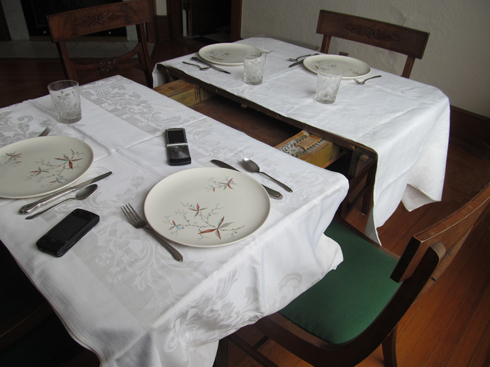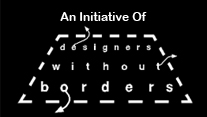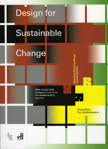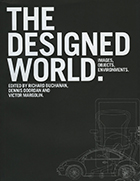Victor Margolin

Several months ago my wife and I had dinner in a restaurant with another couple. My wife is in her late 60s and I am in my early 70s. The other couple was about twenty years younger than us. In that twenty year difference, however, was a digital divide that defined each couple as living in social universes that were vastly different. The difference does not revolve around an attitude towards technology that is starkly pro or con. My wife and I are both active computer users, we share a cell phone and my wife downloads books onto her iPad. What characterizes the difference is the place that we accord technology in our lives and in our relations with others. Speaking now for myself, I grew up in an era before computers and cell phones when face-to-face contact without any supporting mobile devices was the principal means of contact. Whatever you brought to a conversation had to be part of your internal data bank as there were no supporting machines to provide anything additional. Its true that conversations were less precise than many are today but they had a flow that bound the conversing parties together unobstructed by any attention-diverting devices.
When my wife and I met the younger couple in a restaurant, they put their iPhones on the table. At one point in the conversation, the husband picked up his phone and began pressing buttons. I thought he was checking his messages in the middle of our conversation and asked him if he would kindly put his phone away but actually he was only looking up a fact that I had been grasping for and could not remember. This occurred a few more times during the dinner and his wife used her phone to type in book and movie titles that came up in the conversation. During the meal, I wasn’t bothered by these minor interruptions in the dialogue but on further reflection, I realized that there was a generational difference in the way we thought about conversation. Fortunately, the cell phone interruptions had little effect on an otherwise agreeable evening.
Having grown up without mobile devices, I was never bothered if I could not remember the name of someone or some other fact. Of course, when I was younger I remembered more than I do now but nonetheless I learned to participate in conversations as continuous flows rather than dialogues punctuated with periodic shifts of attention to mobiles to look up or record some piece of information. For my sensibilities, such departures from the energy of the conversational exchange are disruptive. I can’t speak for the others but I do know that for those who travel with their mobile phones always close at hand, the shift of attention from person to phone and back again is quite normal. At worst, someone in the middle of a conversation drops out to check his or her phone messages. At best, they believe they are enhancing the conversation by looking up a relevant fact.
I am less concerned about getting every fact right than I am with participating in an energy flow with another person that gives more emphasis to the sensibility that infuses the exchange than to whether or not some facts or additional relevant information are missing from the dialogue. The point is a subtle one since there is no question of bad feeling on the part of active mobile phone users towards anyone with whom they are having a conversation but there is a question of where the focus of consciousness and sense of mastery lies. For me, I value most the ability to maintain a conversation, to make it a creative exchange in which one statement builds on another and helps the exchange move forward buttressed by the energies of the speakers who are able to collaborate in the creative act of conversing. This exchange has a flow and the sport of it is to keep the flow moving. That ability for me is the mastery of conversing, while I am sure that many for whom mobile phones are mental prosthetics, believe that conversational mastery comes from finding a relevant piece of information and inserting it into the exchange.
The two masteries are considerably different. One is about the capacity to sustain contact with another human being over an extended period of time and the other is about being able to retrieve or retain data. I have no problem with the latter but it puts a very different emphasis on the process of communication. In my observation, there is less engagement with the full being of the other and more with the sense of demonstrating a retrieval skill for the sake of enhancing the encounter by providing information.
I thought of an extreme example of this data retrieval mastery, which is probably unfair but nonetheless makes my point. Imagine a couple making love and at a pre-peak moment one or the other retreats to their mobile phone to look up a technique that might enhance their mutual pleasure. What makes this example germane, though improbable is that spontaneity is generally considered to be a positive quality of good sex. Of course mastery of technique is a valuable component of spontaneity but technique without full engagement with the partner will not do the trick for many people.
Taken to its worst extreme, technological devices can easily become excuses for withdrawing from engagement with another. I have noticed that it is quite common for people sitting around a table with others at a restaurant or café to withdraw from the group to check their phone or e-mail messages without even excusing themselves. This has for many become an acceptable norm.
The point with which I began this excursus was not about withdrawal but rather about a form of multiple engagement in which the mobile device is a partner. To face another without such a device means bringing only one’s self and not the Internet to the table. As I was growing up, this was understood. Today it seems to many people like a risk.
Victor Margolin is Professor Emeritus of Design History at the University of Illinois, Chicago. He is currently working on a World History of Design to be published by Berg in London.











Leave a Reply
You must be logged in to post a comment.